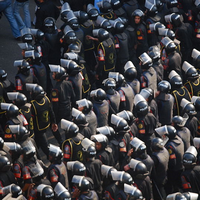The recent events in Tunisia have reverberated across the Middle East and North Africa, but they have found particular resonance in Egypt, where anger and frustration with President Hosni Mubarak's government has escalated considerably over the past year. The violence, corruption and media censorship that accompanied last November's parliamentary elections severely damaged the government's credibility. Exacerbating this general frustration is the expectation that Mubarak's son, Gamal, will succeed him and simply continue the status quo.
In this week's demonstrations, which saw Jan. 25 renamed Youm al-Ghadab, or Day of Wrath, protestors have indeed directed some of their anger at the younger Mubarak, but the main target remains the president himself. Pictures and video footage show protestors shouting and spray-painting the slogan, Down with Hosni Mubarak, on walls and signs in central Cairo. Even a year ago, such open and public criticism of the president was a red line for Egyptian authorities.
Despite Egypt's deep-seated economic, social and political difficulties, the strength and length of the protests seen across the country over the past three days seem to have taken the police, and the Egyptian people themselves, by surprise. Even the numerous self-immolation attempts -- in imitation of Tunisia's Mohamed Bouazizi -- that have occurred over the past week were not enough to convince many observers of Egyptians' commitment to stage such large demonstrations.

